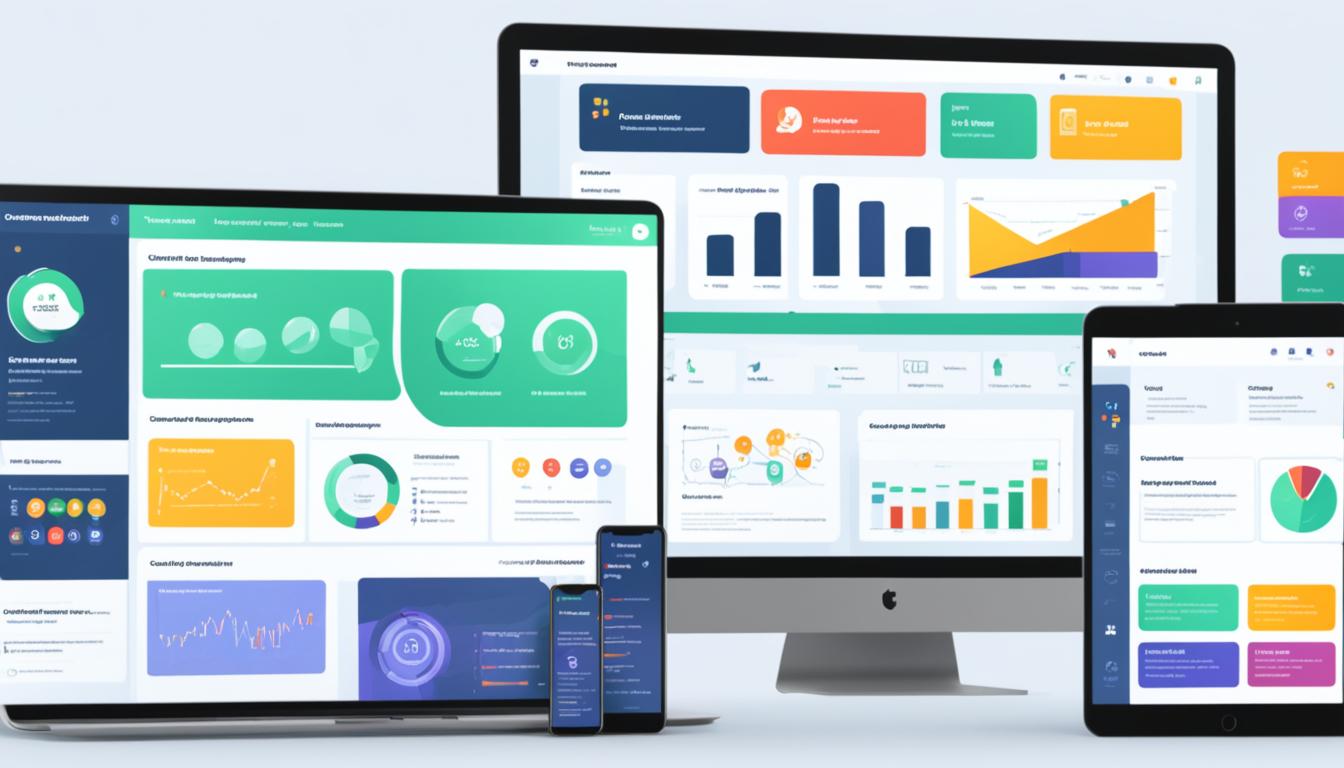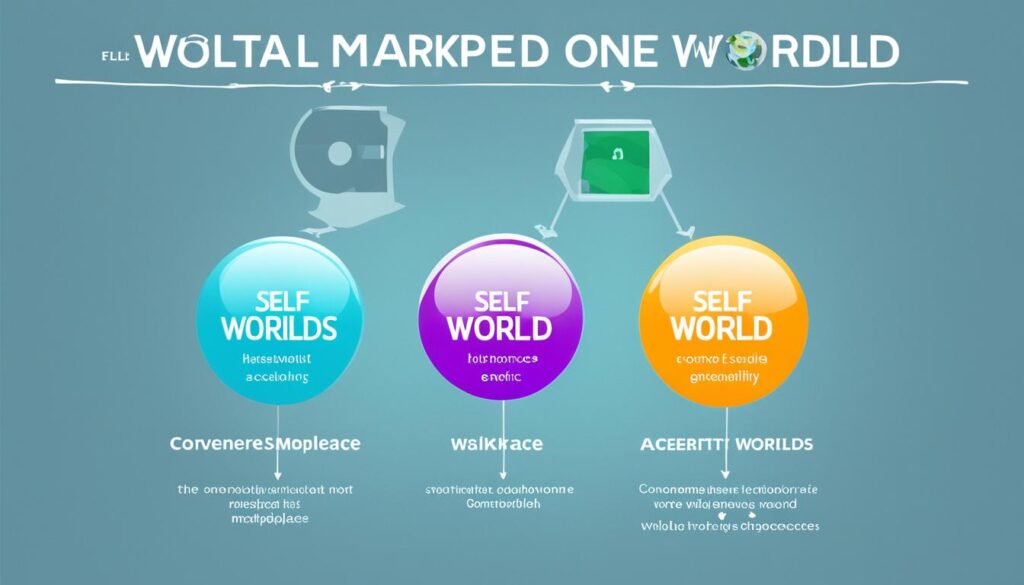Physical Address
304 North Cardinal St.
Dorchester Center, MA 02124
Physical Address
304 North Cardinal St.
Dorchester Center, MA 02124

Discover the ideal platform to host your online course with our comprehensive guide on evaluating features, pricing, and user experience for optimal learning outcomes.
The world of learning has changed. Now, more than ever, educators worldwide can share their wisdom. Not long ago, education was limited to what was close by. But now, with the online learning market booming and set to hit $87 billion by 2024, selecting the best online course platform has become key. This guide offers an overview to help you choose, pointing out the top features and benefits of the leading platforms for 2024.
The e-learning market is growing fast, thanks to more people working and learning from home. By 2027, it’s predicted the global online education market will hit $462 billion. North America is at the forefront of this movement.
This growth isn’t just a phase, it’s changing how we learn and develop skills. Now, selling online courses is a lively business, which is great news for creators and digital entrepreneurs.
Creating an online course lets you teach people worldwide and make money while you sleep. You can also choose when to teach. This flexibility attracts many educators and business owners to the e-learning platforms world.
Today, many people have online courses, which can make standing out tough. But, by offering unique value and knowledge, you can get ahead. Picking the best online course platform is not easy, though. You must consider various aspects like ease of use, tools for creating courses, how engaging they are for students, the cost, and how well they integrate with other systems.
Creators should know the key differences between self-hosted and marketplace online course platforms. Self-hosted platforms let you make your course and keep control over prices, brand, and who enrolls. You manage marketing and build a unique brand. You own the student experience completely, including how they interact with each other.
On the other hand, in a marketplace, you can sell your course but under the site’s rules. You won’t control prices or who can join, and your brand options are limited. This means you won’t have the same level of interaction or give as much value to your students.
| Feature | Self-Hosted Platforms | Marketplace Platforms |
|---|---|---|
| Pricing Control | Full control over pricing | Limited control, subject to platform policies |
| Branding | Ability to create a strong, unique brand | Limited branding options, branded under the platform |
| Student Engagement | Direct interaction and community building | Fewer options for student engagement and interaction |
| Revenue Retention | Retain full course earnings | Platform takes a percentage of course sales (often 50-75%) |
| Student Data | Own student data and email addresses | Limited access to student data and contact information |
The decision between self-hosted and marketplace platforms depends on how much control and personal touch you want. Self-hosted platforms give more freedom and revenue, but marketplaces offer a bigger audience at the cost of customization.

Choosing an online course platform means looking for a great user experience. Both you and your students need to find it easy to use. Look for a platform where you can build your courses easily without the tech hassle.
It should help you organize your lessons into modules. This allows for various content types, like videos and quizzes, making lessons interesting. Also, check if it offers tools that make learning more fun and track student progress.
An effortless course creation and editing tool can make your job much easier. Select a platform with a visual and drag-and-drop editor. This means you can tweak your course without needing to be a technical wizard.
Preview options are also a plus. They ensure what you see is what your students get, maintaining a high-quality user experience.
It’s important for your students to feel involved and connected in your course. Features like discussion forums, live sessions, and group projects are a must. They encourage interaction and learning together.
Adding game-like features can also spark student interest. Think of things like badges and leaderboards. These can turn your course into a fun educational journey.
The cost of the platform is a big deal for your course’s success. High transaction fees can reduce your profit. It’s best to choose platforms with clear, fixed fees.
This way, as your course grows, you can keep more of your money. Look for platforms that don’t take a large chunk of your sales.
First, look at your course goals and who will use it. Think about the customization needed and the tools for learning and features required. This includes the type of experience you want learners to have. Matching the platform’s abilities with these needs makes for a better learning journey.
Know what your course aims to do, like reaching people worldwide, earning money without effort, or offering adaptable learning. Also, consider what your audience likes in content, their tech skills, and the level of interactivity they enjoy. Choosing a platform that fits these will help make your course more effective.
Next, check the tools and options each platform offers. Look at the tools for making courses, using media, adding other apps, tracking data, branding, and helping with marketing. Think about how well the platform can support your course content and plans. This helps to make a smart choice.
| Platform | Key Features | Pricing |
|---|---|---|
| Teachable | Comprehensive payment processing, student engagement tools | 3% + $0.30 per transaction |
| Thinkific | Extensive customization, advanced data tracking, marketing tools | 0% – 5% transaction fees |
| Kajabi | Automation for marketing funnels, detailed analytics | $149 – $399 per month |
| Podia | Zero transaction fees, wide range of multimedia support, community building | $39 – $179 per month |
Considering your course’s goals and who will use it, along with what each platform offers, helps you choose the best fit. This method prepares your online course for success in the long run.
Teachable lets creators make and sell online courses easily. It supports digital downloads, memberships, coaching, and community. This platform simplifies course building for all kinds of teachers.
Its payment options are top-notch, giving students many ways to pay. Creators can see how well their courses are doing through detailed analytics. And, they can make their online space look just right with custom branding.
Thinkific is great for those who want their courses to stand out. Creators can use plenty of tools to make their courses fit their unique style. These include drag-and-drop builders and features to keep track of course stats.
Students get lots of ways to learn, like watching videos and taking quizzes. This makes learning fun and engaging for everyone.
Kajabi is made for business-savvy creators. It not only helps create courses but also builds powerful marketing tools. This way, entrepreneurs can sell their courses effectively. And, they can build their website and email campaigns with ease.
One of its best features is automation for smarter marketing. This means creators can focus on teaching while Kajabi takes care of finding students. With advanced insights, it’s easy to see how well the courses are doing.
Podia is for creators who want to sell various digital products. It makes selling courses and memberships simple with its straightforward design. The best part is, there are no extra fees for transactions, so creators keep more money.
Creators can use videos, PDFs, and audios to make their courses interesting. Podia also offers features for building a community around the courses. This includes things like email marketing and live support for students.

Choosing the right Learning Management System (LMS) has become key for good online education. About 70% of organizations believe this choice is crucial for their training goals. It is vital to deeply look into different LMS features to meet your needs.
LearnDash is a strong LMS plugin for WordPress, designed for making and selling online courses. It’s great for those using WordPress, offering full integration and customization. Features like advanced quizzing and certification support are perfect for schools and training groups. They also have fun game elements, like badges, to keep students engaged and motivated.
Mighty Networks is all about creating a community for your online course. It combines your courses, memberships, and community, making students feel like they belong. This approach uses activities like polls and live events to keep everyone involved. For creators looking to make a dynamic, connected learning space, this is a top choice.
Good marketing and sales tools are the key to getting more students and making more money. Always pick course platforms that have landing page builders. This way, you can create sales pages that work well without needing extra tools. Make sure these builders let you make your pages look unique and test what works best. They should also work well with email marketing and lead collection tools to help you get more students effectively.
Online course platforms should have their own landing page builders. This lets you design attractive and effective sales pages for your courses. You can make your own layouts, add photos and videos, and find the best way to attract students. These builders work smoothly with tools that keep track of leads and help you manage your marketing. This way, you can turn more visitors into students taking your online courses.
Email marketing is still one of the best ways to keep in touch with potential students and current students. Go for an online course platform that links well with email services like MailChimp, Constant Contact, or HubSpot. With proper integration, you can set up emails to send automatically, target specific groups, and see how your email campaigns are doing. This creates a solid, data-backed digital marketing plan.

When your online course business grows, picking the right platform becomes key. Platforms should have strong infrastructure and reliable performance. They need to handle more students and courses without the user experience suffering.
Also, look at the platform’s future plans. Make sure it keeps developing features. This way, it can support your long-term growth and change with your course needs.
| eCommerce Platform | Scalability Features |
|---|---|
| Shopify | Known for scalability and flexibility, catering to businesses of all sizes. Offers a seamless mobile shopping experience to accommodate the rise of mobile commerce. |
| SuiteCommerce | Beneficial for mid-sized and enterprise-level businesses, offering great scalability and performance to handle large transaction volumes and diverse product catalogs. |
| BigCommerce | Recommended for Business-to-business (B2B) companies, providing enterprise-grade features to drive growth. Supported by a cloud-based infrastructure that ensures scalability and reliability for businesses of all sizes. |
Choosing a scalable platform helps you grow your course business. It allows for more courses and students as you expand. Ensuring a great learning experience for your students is still possible even as your business grows.

Having reliable customer support is key for any online course. It’s good to check how quick and helpful they are when you need help. Also, a strong community of fellow creators is valuable. This community can offer support, tips, and advice.
| Platform | Customer Support | Community Features |
|---|---|---|
| Teachable | Email support, knowledge base, and active community forums | Dedicated Teachable creator community with discussion boards and networking opportunities |
| Thinkific | Email, live chat, and comprehensive help center with tutorials | Thinkific’s online community for creators to share ideas, insights, and best practices |
| Kajabi | 24/7 email and phone support, along with an extensive knowledge base | Vibrant Kajabi community with forums, live events, and coaching opportunities |
| Podia | Email, live chat, and a growing library of support articles and tutorials | Podia’s online community for creators to network, collaborate, and learn from each other |
| LearnDash | Email support, comprehensive documentation, and an active WordPress community | Involvement in the broader WordPress community, with opportunities to connect with other course creators |
| Mighty Networks | Email, chat, and a robust knowledge base with step-by-step guides | Thriving Mighty Networks community where creators can share ideas, ask questions, and get support |
When picking an online course platform, think about how supportive their customer service is, and if they have a good community. These things really matter for having a great experience and doing well with your online courses.
Choosing the right online course platform is vital for success. Compare user experiences, tools for creating courses, and how they engage students. Think about the price and the chance to grow. The platforms we looked at – Teachable, Thinkific, Kajabi, Podia, LearnDash, and Mighty Networks – have features to help you build and sell courses well.
The right platform will let you deliver a great learning experience. As the e-learning market grows, opportunities in online education are huge. With the best platform, you’ll reach a big audience and make money on autopilot. Your online course business can grow strong and lasting, changing lives and the future of learning.